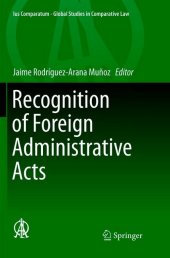 Neuerscheinungen 2019Stand: 2020-02-01 |
Schnellsuche
ISBN/Stichwort/Autor
|
Herderstraße 10
10625 Berlin
Tel.: 030 315 714 16
Fax 030 315 714 14
info@buchspektrum.de |

Jaime Rodríguez-Arana Mu¤oz
Recognition of Foreign Administrative Acts
Herausgegeben von Rodríguez-Arana Mu¤oz, Jaime
Softcover reprint of the original 1st ed. 2016. 2019. x, 388 S. 235 mm
Verlag/Jahr: SPRINGER, BERLIN; SPRINGER INTERNATIONAL PUBLISHING 2019
ISBN: 3-319-79264-4 (3319792644)
Neue ISBN: 978-3-319-79264-4 (9783319792644)
Preis und Lieferzeit: Bitte klicken
This book presents an analysis of the concept of the administrative act and its classification as ´foreign´, and studies the administrative procedure for adopting administrative acts in a range of countries in and outside Europe. While focusing on the recognition and execution of foreign administrative acts, the book examines the validity, efficacy and enforceability of foreign administrative acts at national level. The book starts with a general analysis of the issue, offering general conclusions about the experiences in different countries. It then analyses the aforementioned themes from the perspective of the domestic law of different European nations and a number of international organisations (European Union, MERCOSUR, and Andean Community). In addition, the book studies the role of the European Union in the progress towards the recognition and execution of foreign administrative acts, where the principle of mutual recognition plays a vital part. Finally, the book analyses the international conventions on the recognition and execution of administrative acts and on the legalisation of public documents.
I. The Impact of Corruption on International Commercial Contracts - General Report; Michael Joachim Bonell and Olaf Meyer.- II. New Wine in Old Bottles: Corrupt Foreign Contracts in Canadian Private Law; Joshua Karton and Jenna-Dawn Shervill.- III. Balancing Public Interest with Transactional Security: The Validity of Contracts Tainted with Corruption under Chinese Law; Qiao Liu and Xiang Ren.- IV. Consequences of Corrupt Practices in Business Transactions (Including International) in Terms of Czech Law; Jirí Valdhans.- V. The Civil Law Consequences of Corruption According to the Laws of the Least Corrupt Country in the World - Denmark; Peter Damsholt Langsted and Lars Bo Langsted.- VI. English Judges: Little Mice in the Big Business of Corruption?; Yseult Marique.- VII. Still Some Unclarity Regarding the Legal Consequences Arising from the Nullity of Agreements through Corruption - Estonia; Marko Kairjak.- VIII. Who Gets the Bribe? - The German Perspective on Civil Law Consequences of Corruption in International Contracts; Matthias Weller.- IX. The Effects of Corruption on Contracts in Italy: The Long Road towards a Legal and Fair, Competitive Market; Paola Mariani.- X. Contracts Tainted by Corruption: Does Dutch Civil Law Augment the Criminalization of Corruption?; Abiola Makinwa and Xandra Kramer.- XI. Civil Law Forfeiture as Means to Restrict the Application of the in pari delicto-Principle and Other Private Law Consequences of Corruption under Polish Law; Maksymilian Pazdan and Maciej Zachariasiewicz.- XII. Corruption in International Commercial Contracts - A Portuguese Substantive and Private International Law Perspective; Luís de Lima Pinheiro.- XIII. Russian Experience and Practice on Civil Law Consequences of Corruption; Sergey Usoskin.- XIV. For a Few Dollars More - Corruption in Singapore; Michael Furmston.- XV. The Civil Law Consequences of Corruption under South African Law; Tjakie Naudé.- XVI. Impact of Bribery on Contracts under Swiss Civil Law; Christa Kissling.- XVII. The Civil Law Consequences of Corruption under the UNIDROIT Principles of International Commercial Contracts: an Analysis in Light of International Arbitration Practice; Richard Kreindler and Francesca Gesualdi.- XVIII. The United States´ Multidimensional Approach to Combatting Corruption; Padideh Ala´i.- XIX. Fighting Corruption from the Civil Side: Echoes from the Silence of Venezuelan Contract Law; Eugenio Hernández-Bretón and Claudia Madrid Martínez.


